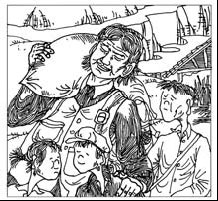Free children from stigmas associated with diseases
Updated: 2007-08-02 07:27
Over the past few days, I have followed on television the footsteps of Lin Qiang into an isolated village in the mountains of Liangshan, Southwest China's Sichuan Province.
 Lin was the first guest from afar to visit the village, built as a local leper colony more than 40 years ago. On his first trip there in March 2005, he had to pass through a one-meter wide dirt track, huge rocks on one side and a deep valley on the other.
Lin was the first guest from afar to visit the village, built as a local leper colony more than 40 years ago. On his first trip there in March 2005, he had to pass through a one-meter wide dirt track, huge rocks on one side and a deep valley on the other.
Since then, Lin, head of the provincial language committee, has gone out of his way to help the village of 177 residents. He secured funds to build a village school, which opened six months after his first visit.
Today, about 31 children under the age of 18 are able to receive basic education.
Largely out of his own pocket, he has had the hilly road widened and brought in a generator, a television set, books and medicines. Last year, he also bought 4,000 kg of rice to help the villagers during a severe drought, despite the fact that each household was also allocated food and other relief from the local government.
Since his first visit, the lives of the villagers have changed a great deal. Parents say their children have become more outgoing. And the villagers can keep in touch with the outside world via the television.
I admire what Lin has done. But I also wonder how many of these isolated communities are still out there crying out for assistance.
Above all, how many people, especially the children, still have to live with social discrimination associated with such diseases as leprosy and AIDS.
As Lin discovered, the children of the village are all healthy. However, because of the stigma of leprosy, no local or provincial education official had provided education for the children.
Lin's school offers a new start for the children, albeit not a centralized boarding schools, which has been promoted by the Ministry of Education to guarantee children in remote and mountainous areas quality education.
It is pleasing to note the stigma of leprosy today is gradually disappearing. There are fewer cases and people are getting immediate medical treatment. Many of the former leper colonies are now getting smaller, and some have disappeared.
In the village under the care of Lin, a young woman has now moved to another county - the first to leave and join mainstream society. Lin hopes others will follow suit.
Social discrimination, however, I must admit, especially that associated with new diseases, such as AIDS, still exists.
China Daily once published a story about a small school attended by just one pupil and a teacher. The boy had the school to himself because he was HIV positive.
While many believed the boy was lucky to have a kind-hearted teacher, it was obvious the boy was being deprived of friendship and other social activities with his peers. How much that deprivation will harm the boy's growth is anybody's guess.
While we praise what Lin has done, we must work harder at making officials as well as the public aware that it is their duty to free people and children from the stigmas of AIDS and leprosy, and enable them to lead healthy and fruitful lives.
E-mail: lixing@chinadaily.com.cn
(China Daily 08/02/2007 page10)
|
|
|
|
|
|